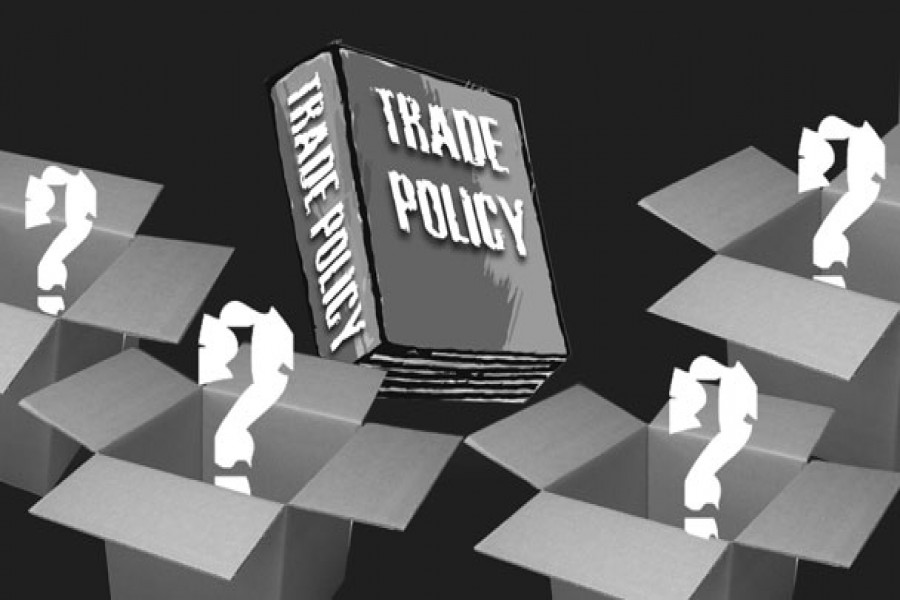
Published :
Updated :

Bangladesh has passed a year without any noticeable change or adjustments in its trade policy. The country's trade policy makers were apparently unresponsive to most of the global developments in the arena of trade.
The past year 2017 started with the US President Donald Trump withdrawing his country from the Trans-Pacific Partnership (TPP), the mega trade deal negotiated outside the World Trade Organisation (WTO). Again, the year ended without any substantive outcome at the 11th ministerial conference of the WTO. In fact, the past year experienced a series of attacks on multilateral trade regime. These attacks, initiated by the US, also encouraged many other countries to take protectionist or anti-free trade stance.
Bangladesh, a beneficiary of the multilateral free trade arrangement, can ill-afford the distortion of the open trade regime. That's why, the country needs to adjust its trade policy and strategies to the changes of the policies and strategies of its major trading partners as well as the changing behaviour of the major markets.
Ever since Donald Trump announced his 'America First' policy and stressed on bilateral trade deal instead of multilateral or even regional ones, most countries were confronted with the need to adjust to the change in US trade policy. Not a single country in the past year signed any bilateral free trade deal with the US. This, however, doesn't mean that there will be none in the near future. As for Bangladesh, the important question is whether it should seriously examine the possibility of signing a Bilateral Free Trade Agreement (BFTA) with the US. Country's apex trade body had earlier suggested going for that.
No doubt, negotiating a BFTA with the US is very challenging. At first, it has to be determined whether the country has adequate capacity and strength to negotiate trade with the US. The current Trade and Investment Cooperation Framework (TICFA) may provide a platform for such negotiation.
In the past year, Bangladesh also didn't make any active move to start fresh talks with the new team of the United States Trade Representative (USTR) on resumption of the Generalised System of Preference (GSP) scheme. There is little hope of reviving GSP by the US administration. But pushing the issue from Bangladesh side would have reflected the country's effort to engage with the US on trade issues. United States is the single largest export market for Bangladesh. In the past fiscal year (FY17), total merchandise export to the US stood at $ 5.84 billion while imports from the US also crossed $1 billion. The country is the third largest trading partner of Bangladesh.
Bangladesh is yet to get duty-free market access to the US though it was an agreed issue under the Hong Kong ministerial conference decision of the WTO. But the US is interpreting the decision in a different manner and not allowing duty-free access, especially to garments which is the major exportable item of Bangladesh. In the past fiscal, the country exported garment products worth $5.20 billion, a slight slide from $5.62 billion in FY16. On an average, the US customs collected 15.60 per cent duties on imports from Bangladesh.
There was also very little effort in setting a strategy to face the Brexit. As Britain is no more with the European Union, it is critical for Bangladesh to take preparation for negotiation to continue the exiting trade benefits in the UK market. Country's export to the UK stood at $3.56 billion in the past fiscal.
In the past year, Bangladesh also announced that it would sign FTA with Sri Lanka which was meant to be the maiden bilateral FTA of the country. Although elaborate negotiations were done to finalise the deal, it didn't hold out that far. BD-Lanka FTA could have been a test case for Bangladesh to experience the dynamics of bilateral free trade deal. It is still not clear what the impediments were in firming up the agreement.
The country's participation in the 11th ministerial conference of the WTO, held in Buenos Aires last December was also not an engaging one. As a lead member of the Least Developed Country (LDC) group, Bangladesh earlier played an active role to push its own agenda along with LDC agendas. But this time there was clearly a lack of enthusiasm to actively engage in the multilateral negotiation process.
The 11th ministerial of the WTO faced a big blow from the US which refused to agree on any deal under the 16-year long Doha negotiations. Many allege that the US undermined the WTO as well as the rule-base trade regime to forward its 'America First' policy. As a result, the WTO ministerial ended without any positive outcome for the developing countries. Moreover, a good number of developed and developing countries announced their intention to initiate plurilateral deals on three new issues-- electronic commerce, investment facilitation and micro, small and medium enterprises (MSME). Bangladesh, however, stayed away from any of these plurilateral deals. Apparently, it was wise to do so.
All these developments in the past year will get carried in 2018. It is important for Bangladesh to actively review the developments and possible implications. Country's businesses and policymakers need to engage themselves in adjusting the trade policy and strategies in line with the global and regional developments. Exploring new markets for exportables and finding new sources of cheaper import of goods are two major challenges in this regard.
asjadulk@gmail.com


 For all latest news, follow The Financial Express Google News channel.
For all latest news, follow The Financial Express Google News channel.